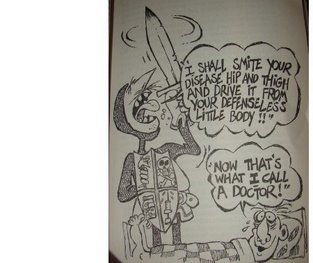The Bogey Man of Defensive Medicine.
In an article titled the Bogey Man of Defensive Medicine the HDC commissioner 's message is pretty much harden up docs. We are doing good work and you should appreciate it. The HDC for some folk is a government appointed guardian of health consumers' interests - a white knight. Others, like myself, don't see it this way.

Change EXPERT to HDC and this cartoon pretty much catches how I felt after the HDC had finished with me 8 years or so ago.
It was a learning experience all right. I've learnt to judge others less. I've learnt that free will, being able to choose my thoughts and feelings, is a fine idea in theory but far from easy to apply in reality. I've learnt that words for the unenlightened, like myself, can hurt and the damage can last for many years. I've learnt, as with the body after trauma, there is emotional scarring.
Sometimes the scarring is keloid in nature and at other times it's almost invisible. I now react in ways I didn't used to - once burnt twice shy as they say. I operate more defensively and I do not interact with patients as openly.
The HDC's promise, intention or claim is that it's job is the fair, simple, speedy and efficient resolutions of complaints.
Resolution is the act or process of resolving. Resolving comes from re- + solvere to loosen or release. There is the meaning here of dissolving or melting, of dealing with something successfully, of clearing something up. This is the soft view of resolution. In this view parties to a dispute expect to be involved in the process and end up experiencing resolution - completion.
Then there is the meaning of an opinion being reached and resolution being a matter of the declaration of that opinion. Here the protagonists are sidelined to one degree or another. They are subjected to the opinion of others. These opinion makers may think the situation has been resolved and that it was resolved fairly, speedily and effectively. The protagonist may not. Who are the HDC's customers? Have they ever been independently surveyed with regards to their level of satisfaction?
From a providers point of view the HDC's job is come up with opinions. The commissioner can keep people on tenter hooks two years or more. He decides on whether or not providers have breached any codes and he comes up with recommendations or 'punishments'. He, in effect, lays charges, decides on what evidence to hear, hears it and passes judgment. He is policeman, attorney for both sides, judge and jury.
Speedy, simple, fair and effective resolution - sounds so soft and cuddly doesn't it. It's mostly firbies. All these words are defined by the act and the commissioner. They do not speak to the the complainant or provider's experience or definitions. It's within the HDC's commissioner's power to impose an opinion but its not within the ability of any third party to resolve anything between me and another. Yes the HDC could help, if asked but how can any of its workers possibly believe that the passage of their opinion will really resolve anything. This is imposition - not resolution. It's crazy thinking.
The quality of these opinions will depend upon the investigating officers level of interest, prejudices and motivations and on the funding of the HDC - maybe even the mood of the commissioner. It may even depend on who whispers in his or her ear. How are we to know? The rules of evidence are as lax as he decides. Providers have no rights to be heard, to see or hear evidence as it is gathered or respond to it. Providers simply wait in ignorance unless the commissioner feels like acting differently. Providers may think that once the opinion has been passed and they have done their 500 hail Marys that it's all over. Well maybe it's not. The commissioner can later change his or her mind and refer a provider for prosecution.
If a provider is referred, ends up in front of the Medical Disciplinary Tribunal and is not found guilty of anything, what happens to the HDC opinion? It stays on the provider's records. Even if it is factually wrong this is so. There is nothing that can be done about this as an HDC opinion can not be appealed. You can ask the medical council to remove it and they will say they can't. When you ask why not, they'll say because of patient safety!!!!!!!! More crazy thinking.

Injustice enrages people Ron. Unfair processes also anger people. You may think you are a fair man - you may well be a fair man, but you don't seem to have an inkling of how unfair your process is to experience. You don't lack intelligence - so why don't you see this. Maybe you can't afford to.
Is the HDC adding to the health of the nation - what are it's benefits and harms - what does it cost? Was it birth based on evidence or agenda?
Does it practice what it preaches? Did I feel respected or treated with dignity - you have got to be kidding. Was I fully informed - of course not.
What about complainants does it work for them? Who knows!
So what's the point of the whole exercise? Who gains from its existence?


No comments:
Post a Comment